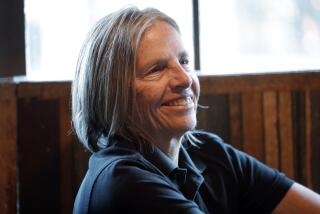The Tragic Story of a Talented and Doomed Poet
- Share via
“If the image of a poet sitting in a bar scribbling deathless verse on the back of an envelope seems impossibly cliched, the stuff of legend, it is because [Ernest] Dowson lived the legend and thereby invented it.” So declares Dowson’s latest biographer, Jad Adams, who has breathed new life into the fading legend of this greatly gifted, sadly dissolute “Decadent” poet of the 1890s.
W.B. Yeats, who came of age in those same years, saw Dowson, Lionel Johnson and Oscar Wilde as “the Tragic Generation.” Although Wilde was generous, witty, flamboyant, a successful poet and playwright, he would achieve tragic stature through the ordeal of his trial and imprisonment for “gross indecency.” Johnson, who wrote, among much else, the splendidly histrionic poem that begins “Dark Angel with thine aching lust / To rid the world of penitence,” was a repressed and tormented homosexual who sought refuge in the Catholic Church--and alcohol.
Ernest Dowson seems to have been even less able to cope with ordinary life. Born in 1867, he worked hard at his literary career, but although he won the esteem of contemporaries like Wilde, Yeats and Johnson, he was barely able to make a living. Yeats remarked: “I cannot imagine the world in which he would have succeeded.”
A shy, sensitive man, Dowson was intimidated by women. Like the author of “Alice in Wonderland,” Dowson worshiped little girls for their unaffected sweetness and innocence. It was his misfortune to fall in love with one particular girl, the daughter of a Soho restaurant owner. For years he loved her and waited for her to come of age. When she married someone else, many believed the poet’s heart was irreparably broken.
While mooning after his adored “Missie,” Dowson had sex with innumerable streetwalkers. The tension between these two forms of love is the burden of his most celebrated poem, “Cynara,” echoes of which can be heard in Cole Porter’s more lighthearted version in “Kiss Me, Kate”: “But I’m always true to you, darling, in my fashion.” The poem’s final stanza, in which the carousing poet is haunted by his one “true” love, furnishes Adams with the title for his well-researched, sympathetic and unusually well-written biography:
“I cried for madder music and for stronger wine,
But when the feast is finished and the lamps expire,
Then falls thy shadow, Cynara! the night is thine;
And I am desolate and sick of an old passion,
Yea, hungry for the lips of my desire:
I have been faithful to thee, Cynara! in my fashion.”
Dowson’s “Cynara,” as Adams notes, became “the defining masterpiece of its period. . . . It is the archetypal decadent poem because it is so obviously written from an age which took its pleasures with guilt . . , [an age] when public morality was still stern but sensuality was rife. . . .”
For all his boozing and whoring, Adams reminds us, Dowson worked hard at his craft. His literary erudition impressed Yeats and Wilde. Although Dowson was not one of Wilde’s closest friends, he was one of only three who came to court to support him on the day the guilty verdict was pronounced.
Dowson’s life is a sad story, ending with his early death at 33 of consumption, but Adams has made it a colorful, affecting and absorbing one as well. His approach is exemplary: neither censorious nor adulatory. He makes excellent use of sources and is discerning as to whom and what to believe. He has a bedrock common sense that enables him to portray Dowson and his decadent friends with a pinch of salt. Yet he also has a keen sympathy and understanding for the man and his milieu.
More to Read
Sign up for our Book Club newsletter
Get the latest news, events and more from the Los Angeles Times Book Club, and help us get L.A. reading and talking.
You may occasionally receive promotional content from the Los Angeles Times.









